The question of how lies heavy around us.
How to keep our sanity? How to move forward? How to defend the dusty old ideas that once seemed so inviolable? How to arrange the small stashes of money we've hoarded up against the inevitable coming of old age when it seems possible the economy may collapse and AI may steal our jobs? How to find meaning in meaningless work? How to find joy in something like a movie or a song when so much seems to be failing around us?
We all have our answers.
My guess is that among people distressed by the state of the world, purchases of alcohol and weed are increasing.
As are instances of simply refusing to pay attention.
As are senseless marital squabbles in which folks displace their stress onto one another, and instances of folks finding themselves staring blankly into the distance remembering some halcyon moment of childhood.
As are recitations of W.H. Auden's observation that "I think a great many of us are haunted by the feeling that our society, and by ours I don’t mean just the United States or Europe, but our whole world-wide technological civilisation, whether officially labelled capitalist, socialist or communist, is going to go smash, and probably deserves to."
But in the face of this moment, I've begun to wonder about something.
What about solidarity?
Is there the possibility of something magnificent and important emerging from all of this? Might we, if things break right and we can find some reservoir of strength within ourselves (knowing that the odds, as always, are terribly long), might we find a kind of renewed, vibrant solidarity that many of us have not felt for a long time, if ever?
Is it possible?
The answer, of course, is probably not. But the "probably" in that sentence is its most important word. Because if the answer is only probably not, then, as a wise man once said, you're telling me there's a chance.
Now, as a wise woman once sang, if we're going to to take on this idea, let's start at the very beginning, because it's a very good place to start. So what does this even mean: "solidarity"?
My American readers will recognize it as a word with a faintly foreign air. They might know that in other places around the world, there are things like "solidarity" political parties, and "solidarity" movements, but that it's not a word applied often in American political thought.
It will not surprise these readers to learn that the word comes to us from the French solidarité, having its root in the word solidaire, which involves the ideas of things being "interdependent or complete." In English, we use it, in part, to mean "mutual responsibility between two or more persons."
It's not that this concept is entirely missing from American political thought. It's just that we have our own spin on it. One of the easiest ways to understand this is to compare it to the word we Americans have been using of late signify a similar notion: "ally."
Righthinking liberals know what it is to be an ally: it means you stand with whatever class of people you believe is suffering from systematic oppression.
But it's important – if you're interested in understanding or operating in this strange, chaotic nation of ours – to note that being an "ally" isn't quite the same as being in "solidarity."
Although it also comes from the French, "ally" is a word much more rooted in the idea of joining things that are, and remain, separate. On sees this in some of the meanings of the words it's derived from, which can mean "to join in marriage" (allien) or to "combine" (alier).
It's a telling difference.
People elsewhere use the language of solidarity to try to grasp the existence of a relationship in which mutual responsibility forms a complete whole; Americans use the language of allyship to denote something more similar to the alignment of entities that remain otherwise independent.
When you become an ally to someone, you do not share their interests. You're on their side in the war, but you're not the same as they are.
When you share solidarity with someone, you share their interests. You're on their side in the war because it's your war too, because they are interconnected with you and you with them.
It's the emergence of this in American thought for which I believe we might be seeing the tiniest crack of a slice of a sliver of possibility. Improbable, yes. A distant dream, absolutely.
But then again, those in solidarity with humanity have always had the far more difficult job than those in solidarity with the powerful.
But solidarity in what? Solidarity for what? What is it, exactly, that interconnects us?
These are, I think the crucial questions. They are the why that can inform the how I was speaking about at the beginning.
And they are questions that can only be answered inside ourselves, by thinking about what we believe and who we are. Therefore, since I cannot get into your head, I have to start by thinking about who I am, and what I believe.
This has been on my mind a great deal since the MAGA hordes began breaking down the gates, and one of the things I have realized is that I am possessed in large part by two opposed ideas. Explaining these will, I hope, help you to understand my hope for solidarity.
The first idea that possesses me is that human beings are inextricably caught between our own simplicity and the terrible complexity of the world.
As a species, we are smart and beautiful, yes, but we are also still just mammals with highly developed front brains sitting atop all the ancient back-brain and brain-stem architecture that evolution has built into us.
If you put a delicious piece of food or a person we're really attracted to in front of us, we're still assaulted by the old reptilian urges. Uuummm. Hungry. Aaahhh. Sexy. If you put a monster in front of us we're going to run away (or perhaps, if we are desperate enough, muster ourselves up to turn and fight), and if you put something we really believe in front of us we will die for it, like a dog defending the human who has spent their life caring for it.
We are animals, the result of a never-ending process that has taken place on this earth for billions of years.
And this leaves us bereft in the face of the astounding complexity of ourselves and our world.
Existence presents us with all sorts of terrors. Take the fact that something like cancer can strike anyone at any time for no reason at all. Or the fact that there is no fairness built into life. Or the fact that despite all of the religious and philosophical buttresses we build, we are often presented by situations, like, say, the conflict between Israel and the Palestinians, in which the moral calculus has no clean solution, not because of some complexity that we could think our way through if we were just smart enough, but because we want to think in terms of there being one truth, one answer, one person who is right in an argument…and in that situation and innumerable others many of the moral claims of both sides are correct.
Perhaps you are an Israeli or a Palestinian and want to protest furiously, and if this is the case, you can make, I'm sure, devastatingly compelling points. Please feel free to do so in the comments. But the specifics of that conflict aside, what you cannot do, if you look at the world clearly and care about being honest, is argue that life is not impossibly painful and complicated at times, or that it does not throw things at us that we're in no way prepared for.
Now, we have a word for understanding what what I'm talking about here, of course: empathy.
Put differently, to be clear-eyed and honest about human existence is to try to confront how incredibly difficult it is – for everyone, in part because of the way we're built – and to do this in a serious way is to be empathetic.
As I noted above, I am also possessed by a second idea, which is in conflict with the first.
Despite my belief in empathy, I also cannot help but believe that there are some things for which there is no excuse.
Take, for example, the recent decision by the Trump administration to rescue the Tate brothers from confinement in Romania and bring them to America, and the rapturous reception that many MAGA followers have given them. If you have not heard about these men, I'm sorry to have to make you aware of their existence. The long story can be learned with the aid of the internet; the short story is that they are sex traffickers who kept women locked in a house and forced them to make sex videos, from which the Tates made enormous amounts of money on the internet.
They are British citizens who were set to be prosecuted in Romania, and yet through the direct efforts of the Trump administration, they have ended up here, in the land of freedom, attending UFC fights and sipping champagne with MAGA types.
Now, despite my perhaps rather radical belief in empathy, there isn't a single element of this series of events for which I can find an excuse. The people who have engaged in it have made choices, and I feel no compunction about judging them accordingly.
These are actions – of the Tate brothers, of the Trump administration, of their MAGA enablers – to which I cannot say Yes. There is something in me, something visceral, something in my gut or my soul, that rebels at the thought. I do not, in some way that is very difficult to understand, have a choice in the matter. I am bound to say No.
Or take the growing MAGA obsession with convincing Trump to pardon Derek Chauvin. If you remember the name but not the details, Chauvin was the cop in murdered George Floyd by kneeling on the back of his neck for almost ten minutes. The logic here is pretty clear. These people have convinced themselves that DEI is a bad thing, and that therefore it should be OK for white cops to murder black citizens.
Again, there isn't a single aspect of this line of thinking for which I can find an excuse.
Yes, we are just clever mammals. And yes, life is hard and complicated and presents us with impossible choices. But I cannot accept this idea that Chauvin should be pardoned. I simply cannot. And, again, I have no problem with saying that there is no excuse for believing that he should be.
Some people may be able to say Yes to this, and to the rest of the MAGA depredations, take your pick, but I cannot. I have no choice but to say No.
I am not a philosopher, and abstract thought – the spiraling crystalline structure of argument about various ethical systems and all the rest – is not my forte. But what I can do is articulate how it feels to be alive and in my skin, and for me – and, I suspect, for many of you out there – at some very basic level, morality is not about argument and shades of meaning and justification.
It is about when and to what you must say No.
So this is the other fundamental element of me, which I cannot avoid and which lies in tension with my inclination towards empathy: morality.
It is for both of these reasons – the fact that I am at once driven to empathy and to morality – that I cannot be a MAGA.
For this is a political movement that has neither empathy nor belief in any serious notion of morality.
That begins at the top, of course, with Donald Trump. One of the most important things to realize about this man (and this applies, incidentally, to the whole class of politicians and Silicon Valley would-be overlords like Thiel and Musk and Zuckerberg and Bezos that he surrounds himself with) is that he cannot be empathetic.
Empathy is not an option available to him, because he doesn’t understand human existence.
How do I know this?
Well, first, he clearly believes that he is somehow superior to other people. This is an obviously inane idea. Consider the things he's done. There is no reason to enumerate the list here; if you're not already convinced that this is a man with a howling void where his soul should be, there's little in this space I can do to change your mind. But the idea that Trump is superior in any way to nearly anyone you see passing in a car on your daily commute is simply laughable.
Second, and more fundamentally, Trump does not understand human existence because he mistakes – like so many people in his position – luck for semi-divine election.
Had Trump been born to, say, a destitute Italian prostitute living in the rubble of post WWI Rome, he would not now be one of the most powerful men in the world. Had he succumbed to incurable cancer as a boy, or died in a plane crash, or had the misfortune of being a child in a war zone forced into underage servitude by a warlord, he would not now be one of the most powerful men in the world.
He is where he is because, in nearly uncountable ways, he got lucky. He was born in the right place at the right time, with the right combination of (rather satanic) skills that propelled him to the top. The truth of this idea has, of course, never occurred to him. He does not have the moral or literal imagination to ponder these sorts of things. He believes he is Trump and deserves a golden throne because that is what is, and that all the rest of it is rubbish.
To the degree that the question of what it means to be alive has drifted across his transom, he has decided that the answer is essentially: Win. Plunder. Kill. Take. Own.
To me, this does not constitute a serious understanding of existence.
Now, perhaps, dear reader, you are tempted to disagree with me. To take Trump's side if not in the particulars, then at least in some of the generalities. Or perhaps you are at least tempted to say that he is entitled to his view, as I am to mine.
The correctness of this is not up to me to say.
But what is up to me to say is that Trump, on a very basic level, is incapable of either an empathy or a morality that I can accept. And the MAGA movement, as (bowel) movements naturally do, contains all of the DNA of its creator.
So what has any of this to do with solidarity?
One of the things happening right now in America is that the masks are falling off in a way that they only rarely do.
This is certainly centered around Trump and his brownshirts. Beyond the specifics of their willingness to say Yes to things like the liberation of the Tate brothers and the pardoning of Derek Chauvin, there is also their willingness to say Yes to a whole host of seismic changes, from the destruction of American decency to the destruction of American government to the impoverishment of its citizens to the ascendancy to a golden throne of man given to things like insisting that Canada become the 51st state.
These are all things to which I have no choice, given my constitution as a human being, but to say No.
And even beyond Trump, this moment is clarifying in its horrors. Many elements of the world that have been obscured are suddenly there in the open for us to see.
Given the events of the last ten years or so, is anyone really unaware of the terrible dangers of modern isolation – and here I'm thinking about both COVID and the reaction to it – either physical or mental?
Does anyone really think that having people sitting around in their rooms on the internet is a net good for society?
Is anyone unaware of how fragile the economic system is, and how totally economically vulnerable we are?
What about the political system? How are people feeling about that? If you were at a local school board meeting and someone proposed a mandatory civics class in which the curriculum consisted of learning about the actual governmental and legal structure of the society in which we live, who wouldn’t support it?
How about the importance of a fiercely independent press? Anyone against that?
And the people in charge? If you walked into a party and said, "Hey! I have a question! Who thinks that we should be so devoted to idolizing the wealthy that we should put an unelected drug-fueled billionaire Tweeter in charge of randomly firing government workers between huffs of ketamine so we can pretend we're "trimming the bloat" when actually we're….huh, what are we doing…? and the billionaire can't answer rationally because he is out of his fucking mind and has no idea what we are doing, none of them does, really, but we're going to let him run our society anyway?" Who would raise their hand and say "Yeah, I think that's a good idea!"?
And on and on.
The things to which we are being asked to say Yes - all around us, in our own society, in the world at large - are clear.
As are the things to which we must say No.
Or at least that's the way it seems to me.
Clearly, however, not everyone agrees with me. In fact, many Americans out there are saying Yes, and, More Please!
In other words, what is clarifying about this moment is that we are starting to learn, publicly, exactly who will agree to exactly what.
The masks are falling off.
There are people out there who are agreeing to stay silent because it will make them money. There have always been people like this; the difference is that now they're out in the open. Naked, for everyone to see which side they're on.
There are politicians who are doing what they know they should not. Many of them.
Some of these politicians are presumably telling themselves that they're waiting for the time when they're finally going to say that enough is enough. Just a little longer, they're muttering. Just a little longer… Others are simply too much in love with the life they lead: the Washington parties, the power, the walking around in that gray suit with everyone knowing that there, yes there, my god, is a SENATOR.
Others are cowards, no more and no less.
And now we know who is who.
There are people who are too busy, and so say Yes. There are people who don't care, and so say Yes. There are people who are simply morally defunct, and so say Yes.
And on and on, all the way down to you and me and the people around us.
But for the rest of us, for the people who must say No, what this moment shows us is that we are, in fact, so deeply aligned as to be insuperable.
You may not agree with my ideas about empathy and morality. You may have your own take on politics, or religion, or the value of Rio Bravo, but you, like me, have no choice but to say No.
We both have the same thing in us, whatever it is, and wherever is comes from, that forces us to say No.
And it is this thing that gives us the ground for solidarity. We are not simply allies; we are the same in the most important way there is.
So this, finally, is how I have come to this idea: What if the opportunity has opened, however tiny, for a kind of new American solidarity based around this?
I do not mean simply the opportunity to send the MAGA cockroaches skittering back into the darkness, but the opportunity to frame this moment as one to be remembered because of how much was revealed.
What if we could become aware again, or even for the first time, of the things that are impermissible, and how important it is to stand against them? What if we realized how much of the modern world is working against our humanity, and how important the fight for that humanity is?
And, ultimately, what if we were able to find our way to a real clarity on the things that matter, the things that we would love to say Yes to?
And wouldn't one of the most important things of all be if, after we have fought through this wreckage, we Americans could discover the joy of solidarity itself?



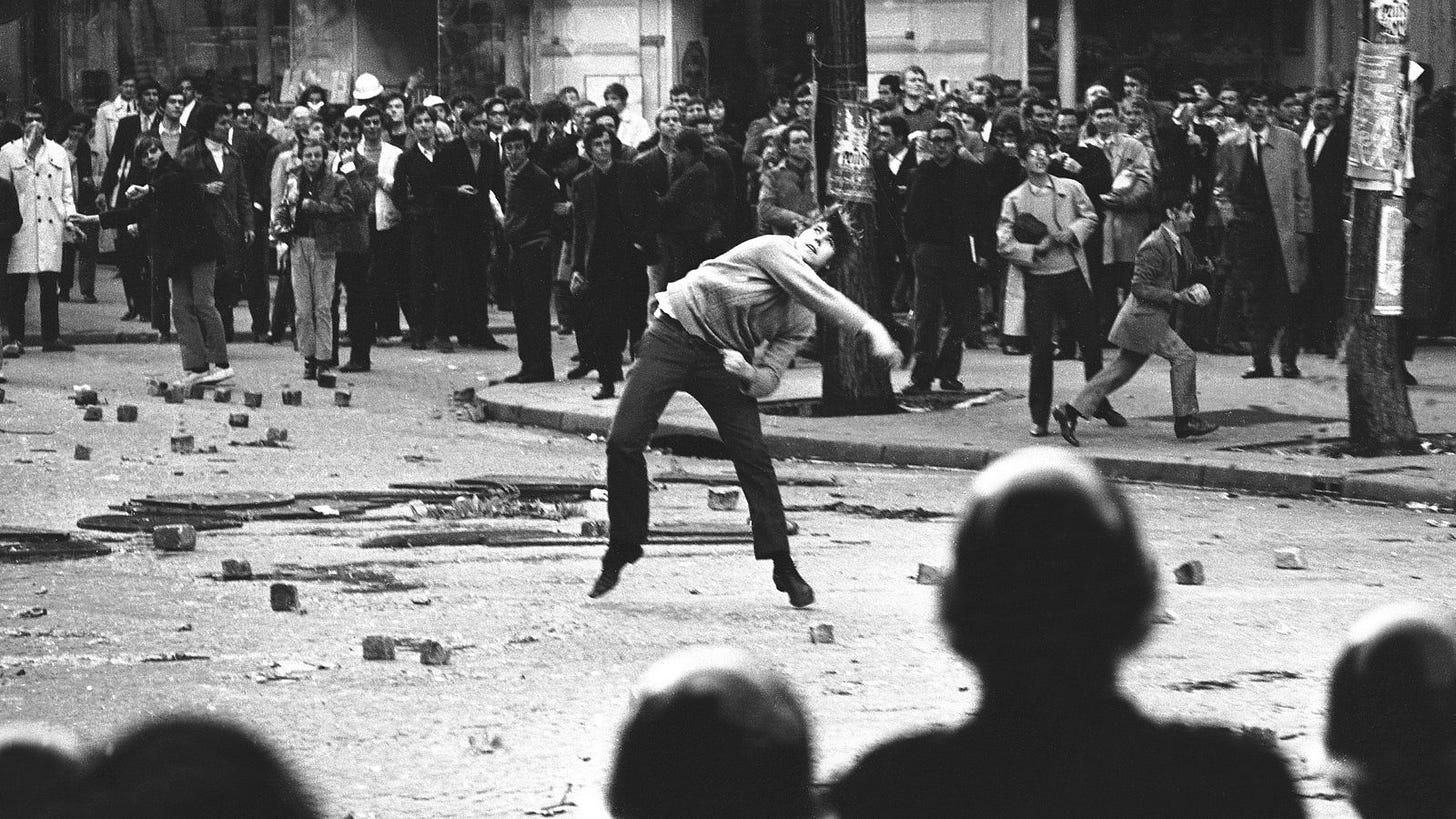


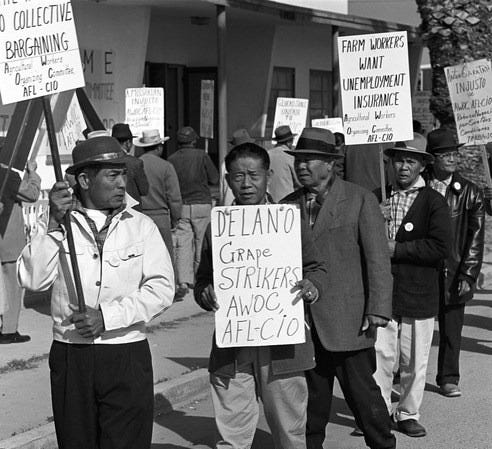
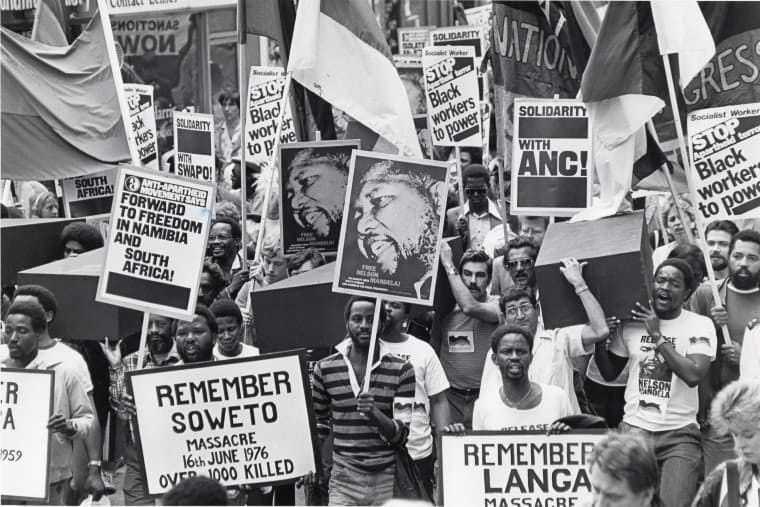

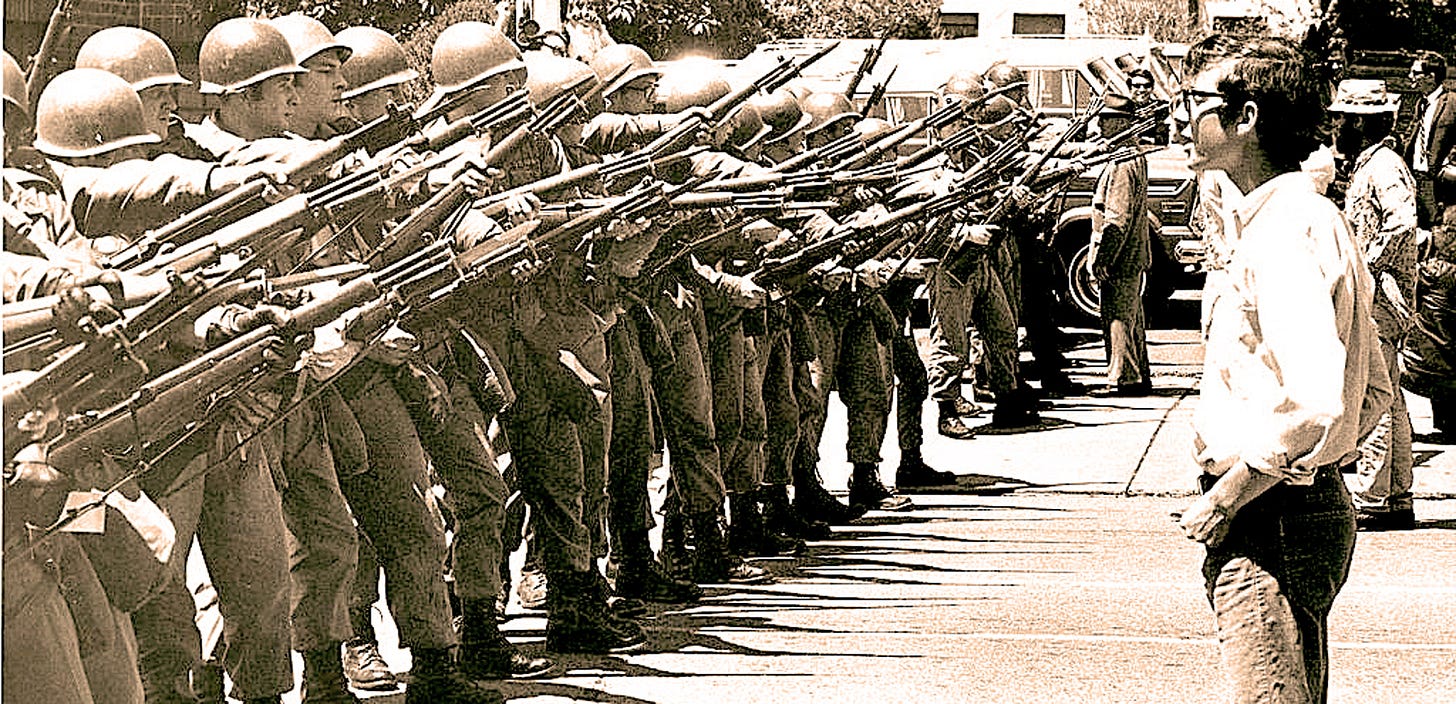
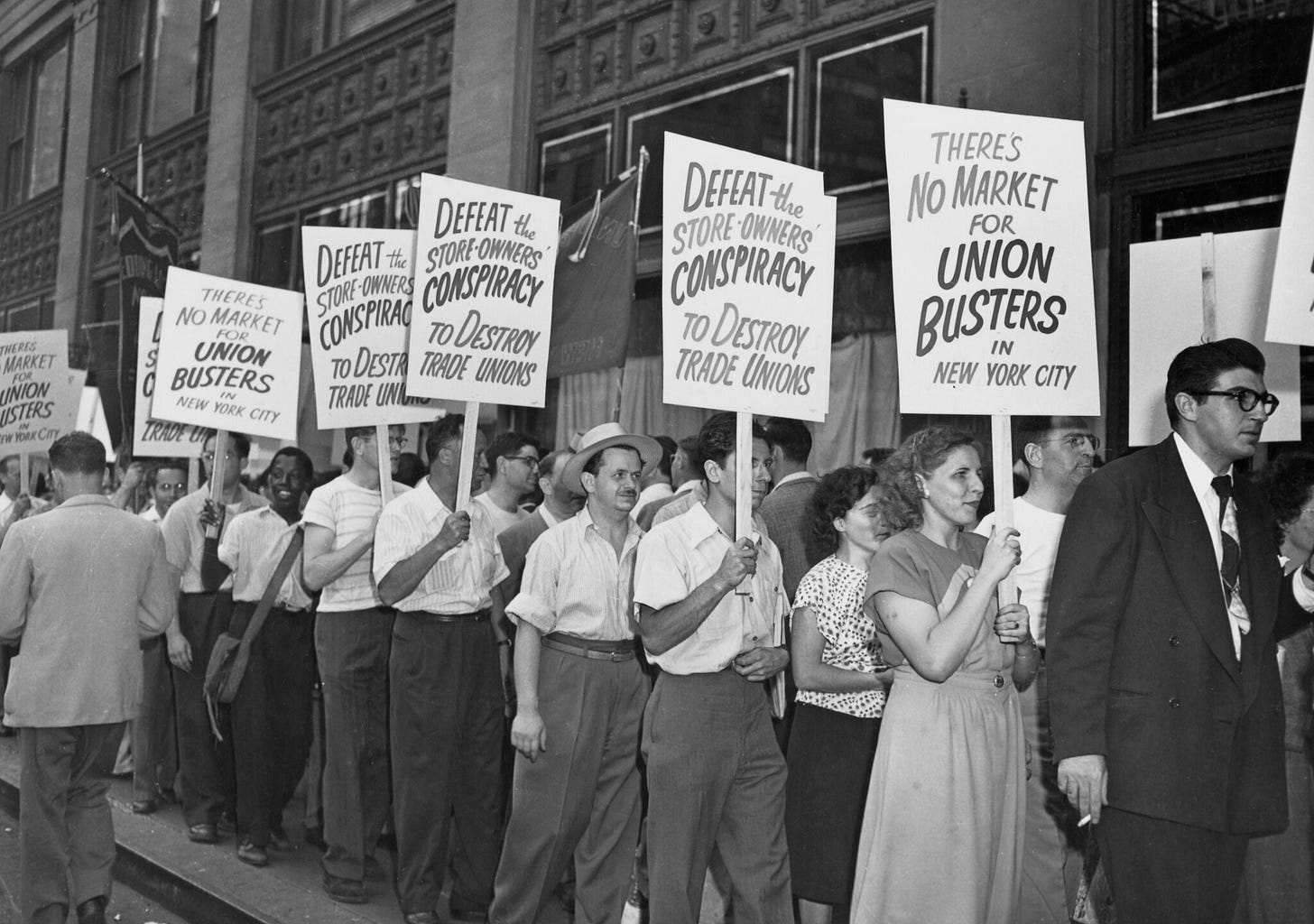
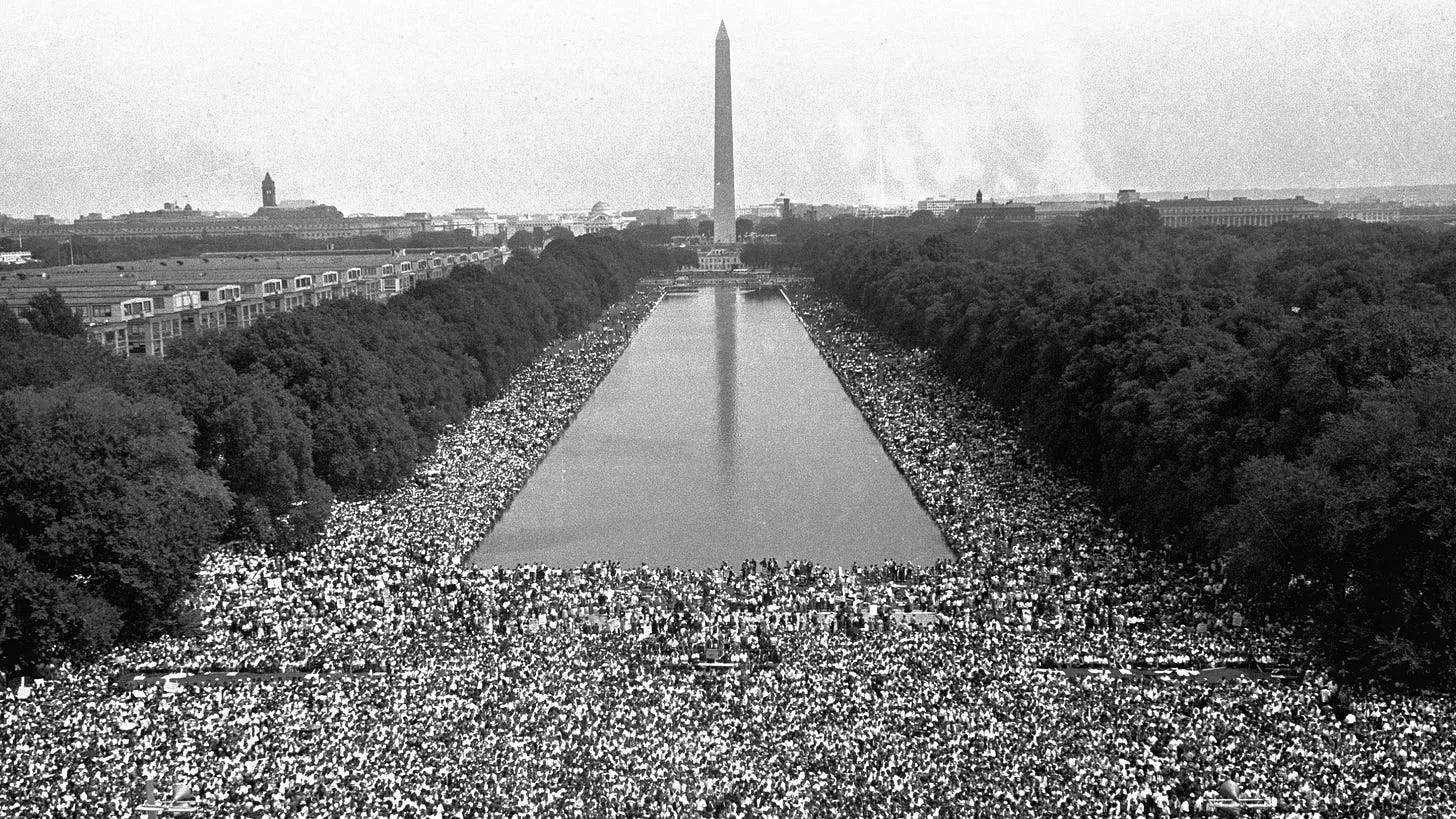
I like that you open with a discussion of allyship vs solidarity, because I think it really is key. I'm no expert in the matter, so take what I have to say with the biggest grain of salt on the planet, but allyship tends to be situational (if not outright transactional), and frequently (but not exclusively) the result of interests aligning. The bonds are tenuous, easily broken, and there is an unspoken understanding that the relationship comes with an expiration date. Solidarity is, for lack of a better word, absolute: I celebrate your triumphs and suffer your injustices and fight for your liberation as if it were my own because, well, it is.
I'm not exactly the biggest of Foucault fans, but I do mostly subscribe to his idea that (among free people), power dynamics are fluid. Power never belongs exclusively to one party or to the other, but there is a constant tension between the two and the dynamic can change, or even flip entirely, depending on the situation. In any situation, I empathize exclusively with the oppressed and never with the oppressor. Because of shifting power dynamics, and because groups and individuals are rarely oppressors in every single facet of their lives, I CAN find myself empathizing with people that I generally find execrable because I don't believe that being a horrendous piece of shit means that you deserve to be abused, exploited or to be stripped of your basic, fundamental rights as a human being. That's the real test of a belief, if it holds firm even when holding it becomes inconvenient Women can be homophobic. People of color can be transphobic. Gay people can be racist. I can empathize with their suffering and oppression while condemning their bigotry.
But goddamn am I struggling with MAGA because, shit, they voted for this. They were warned, they were told, evidence was presented, they lived through for years of it, Project 2025 was covered extensively, Trump's cabinet (and even he himself) were open about what they wanted to do and how they were going to do it, and these people voted for him. And here's the part that makes it so tough for me: they didn't vote for him IN SPITE of those things (and willingly selling out those with less power in order to save a few bucks is already the most disgusting thing a person can do), they voted for him BECAUSE of them. They WANTED him to hurt the powerless. They WANTED him to humiliate and dehumanize and eliminate the marginalized. They WANTED the erosion of democracy, the stripping away of rights, the legitimizing of violence, the elimination of regulatory oversight and foreign aid. They just didn't want it to also happen to THEM. And that is something I refuse to empathize with.
I can understand it, and there are countless studies about the differences between progressives and conservatives (down to the way their brains tend to be structured), about why such large swathes of people are susceptible to cults, the appeal of authoritarianism, etc. But empathize with these people? At this point? After all that has happened, all the work that has been put into bringing back to reality, and their staunch refusal to believe anything they don't want to hear, no matter how much evidence is presented? Nope. I'm with Rachel Zegler. May they never know peace. That may not be the most helpful sentiment in order to move forward, and once again, goddamn do I admire your willingness to conceive of a somewhat optimistic way out of this (and I am under no illusions that this is an easy thing for you to do), but I'm not there yet. I'm still firmly in fuck you mode.
Free Palestine.
This is good stuff. You are right to focus on empathy, or the lack of it, that separates, rather than solidify us. I saw Musk acting the victim, due to the assaults on his brand, cars and facilities of late, lamenting the fact that Democrats are supposed to be the party of empathy and compassion.
His implication, although he has no proof that the perpetrators are Democrats, is that it's OK for Republicans to act in the opposite way, as if being the anti-empathy party gives them license to illegally cut programs and cut everything that they don't agree with. If you read Issacson's bio of Musk you quickly learn that Musk's weakness as a human, and his strength as a entrepreneur, is that he has little to no empathy. He acknowledges this but mainly because it's a get out of jail free card to justify his Machiavellian ways.
Most sociopaths have little to no empathy. Now for the mic drop. I believe I am a sociopath. Not in the ugly and horrific way that people see people like Musk, Nixon or the worst of the kind. I mean like this woman who wrote the memoir that describes a kinder, gentler sociopath than most visualize when they hear the word. I have used it to my advantage to be remain hyper-focused and successful in my work, sports, school, and play growing up. I also never did time, committed a felony, or resorted to violence to settle a score. But adly it probably led to my divorce after 30 years.
I must say that lack of empathy in a person is not what drives them to become MAGA leaders, supporters or minions. I was lucky enough to have been born to and raised well, likely by at least one and maybe two sociopathic parents. Hard to say for sure. And they had good upbringing before them. The lizard impulses in all of us can rule our worlds. I found the best lizards in my youth on a rugby pitch. But they were all well raised like me. The ones with empathy or emotional intelligence went on to do really great things. The ones that lack empathy and a good family life as children are the ones to watch out for.
https://www.goodreads.com/book/show/176443093-sociopath